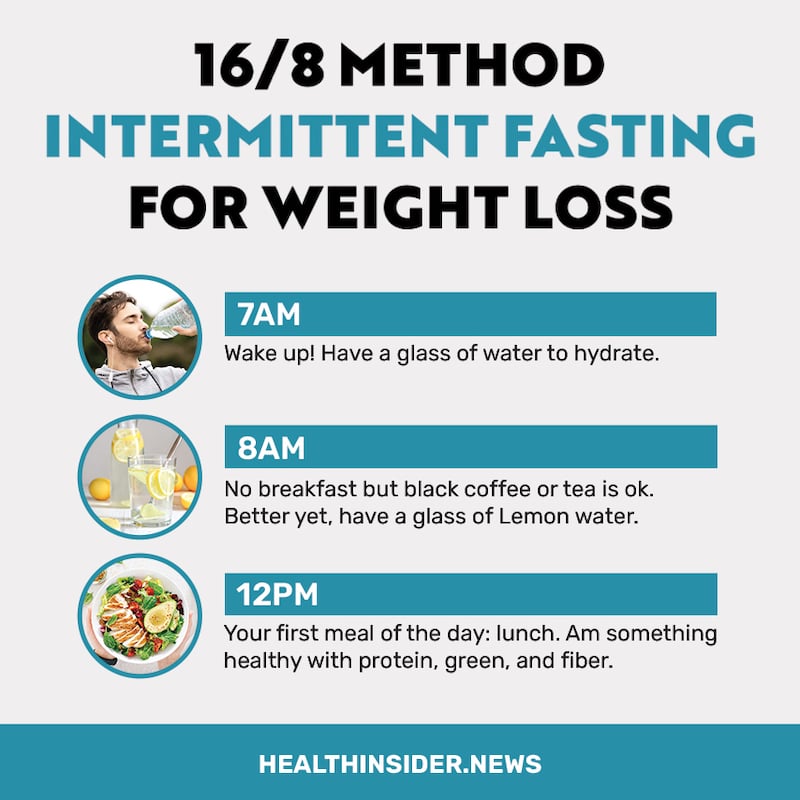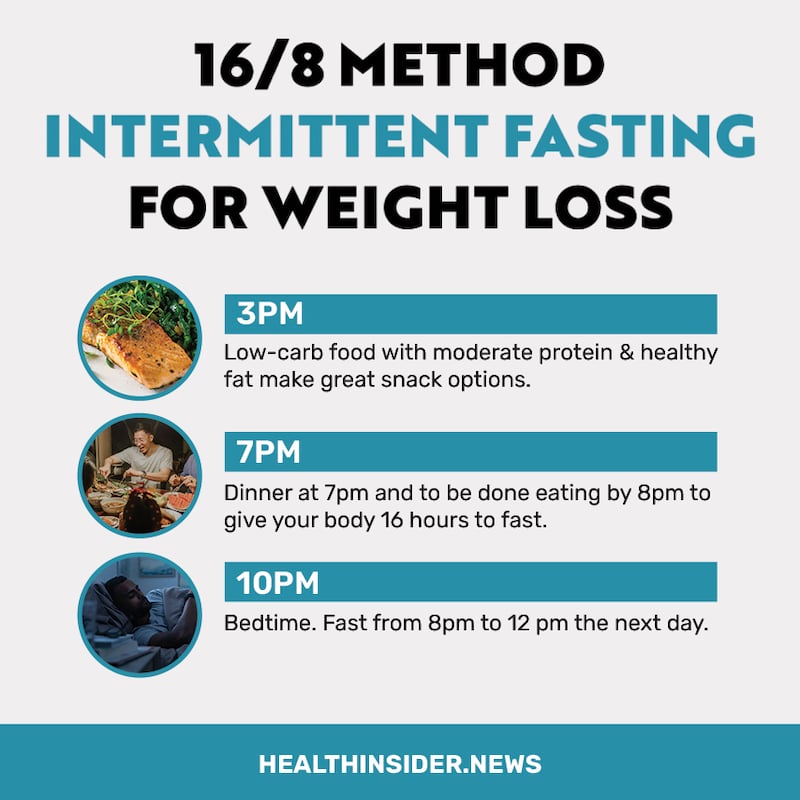Intermittent Fasting 101 – A Beginner’s Guide (2023 Edition)

Intermittent fasting is a popular method of dieting known for its weight loss benefits.
Along with weight reduction benefits, intermittent fasting (IF) comes with many other health benefits, including improved insulin reduction, reduced inflammation, and improvements in levels of cholesterol.
Below, we have summarized all you need to know about intermittent fasting, including how intermittent fasting works, the benefits, and the drawbacks of this weight loss method. Keep reading to learn more.
What Is Intermittent Fasting?
Intermittent fasting is a weight-loss method characterized by periods of fasting and periods of eating.
Most methods of IF are time-restricted fasting methods. However, there are some exceptions.
With most intermittent fasting methods, you would fast for a set period, consuming only zero-calorie beverages, like water, black coffee, and green tea, and only eat during the set eating window.
Intermittent fasting should be combined with a healthy diet and regular exercise, like running or cycling, for best results.
How Does Intermittent Fasting Work?
Intermittent fasting involves set eating and fasting periods. This could be eating for 8 hours each day and fasting the other 16 hours, like in the 16:8 method (the Leangains diet). It could also mean fasting for two full days a week, or fasting for more than a day, like on the 48-hour fast, or simply skipping meals.
During eating periods, you are still expected to consume healthy foods and not exceed a standard calorie limit. During fasting periods, you should only drink calorie-free beverages, like black coffee and green tea, and take any fasting-friendly supplements you need.
Is Intermittent Fasting Healthy?
Intermittent fasting is considered a safe way to lose weight, provided you do not have a condition that would be exacerbated by fasting (for a full list of those who should not fast, see below.)
Intermittent fasting is a great way to lose weight. Reducing your weight has a number of benefits, including lowering your risk of a range of illnesses, including cardiovascular disease, diabetes type 2, and other chronic diseases. It could also help with managing type 2 diabetes.
It also comes with many other benefits for your health, including improved brain activity, improved insulin sensitivity, and a reduction of inflammation in the body.
The fasting method is one of few scientifically-backed weight loss methods, and it allows you to eat what you would like, provided you stick to your eating schedule. However, it can be an unhealthy dieting method if not done properly.
It is essential while using IF to stick to healthy eating, ensuring you’re getting all the nutrients your body needs and regular exercise.

Advertisement
4 Types of Fasting
There are several different intermittent fasting methods. We have summarized each different type below.
#1 Time-restricted eating
Time-restricted eating is probably the most popular method of IF. It involves eating and fasting on a regular schedule each day. Time-restricted methods of intermittent fasting include the 16:8 method, the 18:6 method, and the 20:4 method.
A typical day on the 16:8 method would look something like this; you would stop eating at 8 PM after your evening meal, then fast for sixteen hours, and begin eating again at midday the next day. This method is a good choice if you usually skip breakfast anyway.
For the 18:6 method, you would stop eating at 6 PM, then fast until midday the next day. And for the 20:4 method or the Warrior Diet, you would fast for 20 hours and “feast” for four.


All of these time-restricted eating methods are flexible, meaning that if you prefer to eat breakfast, you can move your eating period to cover the time you usually eat breakfast.
During the eating periods, you should not exceed a normal caloric intake and should eat healthy and nutritious foods, avoiding junk food and highly processed foods.
#2 Alternate-day fasting
Alternate-day fasting means fasting every other day. It means that you can eat however you’d like on one day but then can only consume calorie-free beverages for the next full 24 hours.
This method differs from the time-restricted eating methods as you fast for the entire day rather than eating on a schedule each day.
#3 Eat Stop Eat
The Eat Stop Eat method is slightly more flexible than the alternate-day method. It is sometimes called the 24-hour fast and involves fasting for a full day, once or twice a week.
#4 The twice-a-week method
The 5:2 method involves normal eating for five days a week and then either fasting or eating at a much-reduced calorie intake for two non-consecutive days a week.
The 5:2 method is a calorie-restricted form of intermittent fasting.
On fasting days, women are limited to 500 calories, and men are limited to 600 calories. How you consume these calories is totally up to you, as long as you stick to the limit on the set days.
7 Benefits of Fasting
Intermittent fasting is well-known for its many health benefits. Below we’ve summarized some of the key benefits of intermittent fasting.
#1 Better brain activity
Intermittent fasting benefits the brain in a few different ways.
To begin with, it is thought to slow the aging process and reduce inflammation in the brain. Inflammation in the brain has been linked to several neurodegenerative diseases, like Alzheimer’s.
In addition, metabolic switching in the brain increases neuroplasticity, which can optimize brain function and help protect against illness and brain injury.
Frequent fasters have reported feeling that they have a clearer mind and feel happier when fasting.
#2 Insulin resistance
Intermittent fasting is an excellent method of reducing high blood sugar levels and insulin resistance – both of which are factors in developing type 2 diabetes.
Though most research suggests that intermittent fasting is a protective diet for those at risk of developing type 2 diabetes, there are some differences between the sexes. One study in women showed that intermittent fasting could worsen blood sugar management.
#3 Improved cholesterol
Some studies, using both intermittent fasting methods and the fast observed during Ramadan, have shown that long fasting periods may positively impact LDL cholesterol levels in the blood.
LDL cholesterol is well-known as the bad kind of cholesterol, and reducing its number in the body can help improve heart health and reduce your risk of chronic illnesses.
#4 Reduction of inflammation
Inflammation is a natural defense in the body. It is helpful in response to injury, but it can wreak havoc on the body when it becomes chronic. Chronic inflammation has been linked to various illnesses, including arthritis, diabetes, cancer, and heart disease.
Intermittent fasting has been shown to reduce this inflammation in the body. It has also been shown to reduce oxidative stress, which, like inflammation, has been linked to many illnesses.
#5 Weight loss
Intermittent fasting works for weight reduction in three ways.
Intermittent fasting helps you to reduce your calorie intake without restricting the calories you can eat each day. Rather than being told the number of calories you can eat, you limit the time you eat, making it physically impossible to eat too many calories.
The caloric restriction induced by fasting benefits those who have struggled to stick to a calorie-limiting diet in the past.
Fasting also induces a state of ketosis in the body, which helps the body burn fat. This metabolic state is when the body burns fat stores rather than blood sugar and occurs when blood sugar levels are reduced for an extended period (or through the keto diet).
Ketosis is usually induced between 10–12 hours of fasting and helps you to reduce weight.
Lastly, intermittent fasting is thought to boost your metabolic rate. Your metabolic rate refers to how fast your body burns through calories, including the calories your body uses to breathe and perform other essential life functions.
An increase in metabolism can ensure that you burn through consumed calories more quickly, helping you lose weight.
#6 Heart health promotion
Intermittent fasting improves several markers of poor health in the heart, including cholesterol, high blood pressure, and triglyceride levels. It has been shown to reduce the risk of heart disease.
Intermittent fasting is also a good weight reduction method, and losing weight can improve your heart health.
#7 Longevity
Intermittent fasting has been shown to improve autophagy. Autophagy is the process by which cells are recycled, repaired, and renewed. Increased autophagy has been linked to increased longevity.
Autophagy has also been linked with various other health benefits, including possible benefits for cancer patients.
Possible Downsides of Fasting
As with any dieting method, intermittent fasting has some downsides, which are summarized below.
#1 Eating disorders
Intermittent fasting is not recommended for those who have experienced disordered patterns or have a history of eating disorders.
The restrictions on when you can eat that come with this dieting method can encourage disordered eating and lead to an eating disorder.
#2 Malnutrition
Due to the restrictions on when you can eat, some people may find that they do not consume enough of the nutrients that their body needs to maintain muscle mass and healthy function. This is why it is essential that you consume a healthy and balanced diet during your eating period.
You should eat whole grains, fruit, vegetables, and healthy fats and avoid processed foods to ensure that you meet the daily requirements for clinical nutrition.
The DoFasting app could be an easy way to ensure that you meet all of your nutrition needs as it provides a space for nutrient tracking.
#3 Hunger pangs and extreme hunger
Fasting for long periods can cause extreme hunger and hunger pangs. This can make it uncomfortable and can lead to people feeling ill.
You can curb some of these drawbacks by taking appetite suppressants during your fasting period until the side effects go away and you no longer feel hungry during a fast.
What to Eat Before Fasting
Whether you’re fasting for 12 hours or 24 hours, it is a good idea to prepare your body for this period with a large meal. During your eating window, we recommend eating lots of highly nutritious foods. Good foods to eat before a fast include:
- Vegetables with lots of fiber, like dark leafy greens, broccoli, cauliflower, and cabbage
- Legumes, like beans, lentils, and peas
- Healthy fats, such as those found in avocadoes and extra virgin olive oil
- Lean protein
Can You Eat Anything While Intermittent Fasting?
While intermittent fasting does not restrict what you can eat, we would always recommend eating lots of nutritious foods. Following a healthy and balanced diet during your eating period can help to enhance weight reduction and overall health.
No rule says you cannot eat lots of processed and sugary food while on an intermittent fasting diet. However, this kind of food is unlikely to nourish your body correctly and can make your fasting period more difficult due to a lack of fiber.
Who Should Avoid Fasting?
There are a few people who should not try out intermittent fasting. These include:
- Pregnant or breastfeeding women
- Children
- Anyone with a history of eating disorders
- People with low blood pressure
- Anyone taking medications that could be affected by fasting
While intermittent fasting is beneficial for those with diabetes, we would always recommend seeking medical advice before trying this dieting method first. Your doctor can help you evaluate the diet’s risks before starting.
In addition, if you have any kind of condition that could be affected by fasting, speak with a health professional before trying it.
FAQs
Fasting is a period of time when you refrain from consuming any food and drink only water and other calorie-free beverages. Fasting is sometimes a religious observance, and definitions may differ from religion to religion on what constitutes fasting.
Fasting is thought to help you lose weight, as prolonged fasting can induce a state of ketosis. Ketosis enhances fat loss. Fasting also forces a calorie restriction which also helps with weight loss.
Water and other calorie-free beverages, like unsweetened black coffee and green tea, are all allowed during fasting periods on intermittent fasting. You must drink enough water not to become dehydrated while fasting.
Green tea will not break a fast during intermittent fasting. It is a zero-calorie beverage, meaning it will not increase blood glucose and therefore break a fast. If consuming green tea during a fast, it must be unsweetened as sweetened green tea could break a fast.
Most fasters allow sugar-free gum during a fast. Sugar-free gum will have minimal impact on blood sugar levels and should, therefore, not break a fast. Some stricter fasts may not allow it, though.
You can take most vitamins while fasting. However, if your vitamins need to be taken with food, you should wait until your eating periods to take them. Some vitamins, like iron supplements, can cause nausea if not taken with food.
A Word From Our Nutritionist
Intermittent fasting is an excellent diet if you’re looking to reduce body weight and promote fat loss. There are various methods, including the 12-hour fast, the Warrior Diet, and the alternate-day fasting plan.
Scientific evidence has shown intermittent fasting to be a good weight loss method for overweight adults, but it also comes with many other health benefits. Benefits include increased longevity, increased insulin sensitivity, improved brain activity, and reduced risk of heart disease.
Many human studies have confirmed these benefits, and wellness professionals generally agree that this dieting method is safe and healthy for most people.
When following an intermittent fasting dieting plan, it is recommended that you follow a balanced diet during the eating window to promote weight reduction, improved overall health, and make the fasting period easier.
Intermittent fasting is a good choice for those who have found restricting calories difficult and struggled with losing weight using other methods. The intermittent fasting method, in most cases, does not require you to limit calories consumed and promotes weight reduction in other ways.
Conclusion
Intermittent fasting can help you reduce body weight and your risk of many medical conditions, among other benefits. There are many different methods to try, which are considered safe for most people.
Intermittent fasting is an effective method of weight loss, particularly for those who have struggled with calorie restrictions in the past. It allows you to eat the food that you want and restricts the time that you eat rather than the food you eat.
If you’re new to intermittent fasting and want a helping hand, try a fasting app that can help you stay motivated and track your progress easily.







Comments (0)